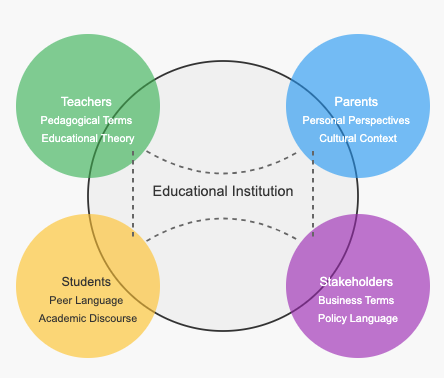
Effective communication is the foundation of successful educational leadership, yet its complexity often challenges even the most seasoned administrators. Leaders must navigate conversations with multiple stakeholders - each bringing their own linguistic perspectives and cultural frameworks to every interaction.
Ludwig Wittgenstein's concept of "language games" offers a powerful lens through which educational leaders can understand and improve their communication practices. This philosophical framework suggests that language operates not as a fixed system but as a dynamic set of activities embedded in specific contexts and relationships.
The challenges facing educational leaders today - from implementing new initiatives to building community relationships - often stem from communication gaps that arise when different groups use language in different ways. Understanding how language functions as a game with context-dependent rules can help leaders bridge these gaps and create more effective dialogue across their educational communities.
Wittgenstein's language games
Language games permeate every aspect of school life, from formal board meetings to casual playground conversations. In each context, language operates according to distinct rules and patterns that participants must understand to communicate effectively. These games aren't merely about vocabulary or grammar - they encompass the entire way meaning is created and shared within specific contexts.
Consider how a simple phrase like "student progress" takes on different meanings in different contexts. In a parent-teacher conference, it might focus on individual growth and personal development. In an administrative meeting, the same phrase could center on measurable outcomes and standardized metrics. In a student counseling session, it might encompass social-emotional development and peer relationships.
The power of Wittgenstein's insight lies in recognizing that these different uses of language aren't merely variations on a fixed meaning but represent distinct language games with their own rules and purposes. Educational leaders must become skilled players in multiple games simultaneously, adapting their communication style and content to each context while maintaining consistency in their overall message.
Navigating diverse language games
Educational institutions represent a unique convergence of multiple language games, each shaped by professional roles, cultural backgrounds, and institutional contexts. Leaders must recognize and navigate these diverse linguistic landscapes with sensitivity and skill. The language game played in a curriculum planning meeting differs fundamentally from that of a parent engagement event or a student assembly.
Teachers bring their own professional vocabulary and conceptual frameworks, developed through training and classroom experience. Their language game often includes pedagogical terms and references to educational theory that may be opaque to others. Parents, meanwhile, approach school communication from their personal and cultural perspectives, often using language that reflects their hopes, concerns, and expectations for their children's education.

Students themselves participate in multiple language games, switching between academic discourse, peer communication, and family interactions. They often create and maintain their own linguistic conventions that can seem foreign to adults but are crucial to their social and academic lives.
Community stakeholders add another layer of complexity, bringing business terminology, policy language, or community-specific expressions into educational discussions. Each of these groups operates within its own language game while needing to interact with others in meaningful ways.
Building shared understanding
Creating common ground among these diverse language games requires intentional effort and strategic leadership. Educational leaders must act as linguistic bridge-builders, helping different groups understand each other while maintaining the integrity of their unique perspectives.
This process begins with acknowledging the legitimacy of different language games within the educational community. Rather than privileging one way of speaking over others, leaders can work to create spaces where multiple linguistic approaches can coexist and contribute to richer understanding.

Professional development opportunities can help staff members recognize and navigate different language games effectively. This might include training in cultural competency, communication skills, and strategies for explaining complex concepts in accessible ways.
Regular community dialogue sessions can provide opportunities for different groups to share their perspectives and develop shared vocabulary for discussing important educational issues. These sessions work best when structured to encourage genuine exchange rather than one-way communication.
Practical tips for educational leaders
Successfully navigating language games requires both awareness and intentional practice. Leaders must develop their ability to recognize different language games in action and adapt their communication strategies accordingly. This includes being mindful of power dynamics that can privilege certain ways of speaking over others.
Creating inclusive communication environments means establishing clear channels for feedback and dialogue across different groups. Leaders should regularly assess the effectiveness of their communication strategies and be willing to adjust their approach based on community needs and responses.
Building a shared vocabulary while respecting diverse ways of speaking requires patience and persistence. Leaders can work to develop common reference points while maintaining space for different expressions of educational values and goals.

Finally, educational leaders should remember that language games evolve over time. Staying attuned to changes in how different groups use language and remaining flexible in communication approaches helps maintain effective leadership in a dynamic educational environment.
This understanding of language games ultimately serves to create more inclusive, effective, and equitable educational communities where all voices can be heard and understood.
References
Biletzki, Anat and Anat Matar, "Ludwig Wittgenstein", The Stanford Encyclopedia of Philosophy (Fall 2023 Edition), Edward N. Zalta & Uri Nodelman (eds.), URL = <https://plato.stanford.edu/archives/fall2023/entries/wittgenstein/>.
Das, D., & Neog, R. (2021). Language game: Ludwig Wittgenstein. Available at SSRN 3785194.


